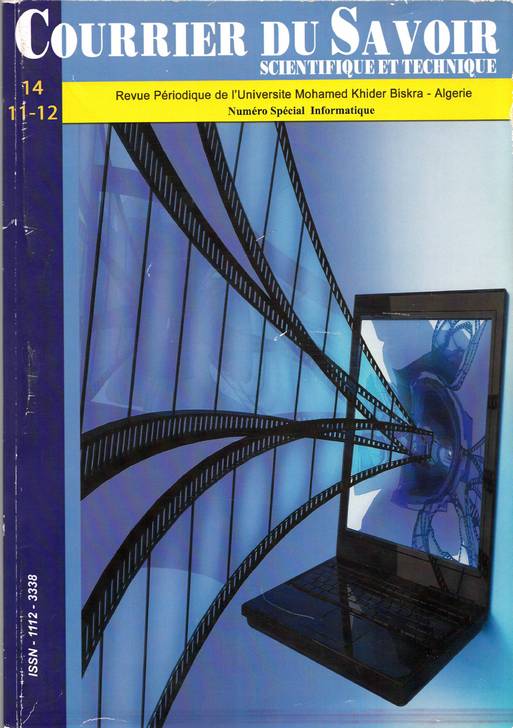A MULTI-AGENT APPROACH FOR EDGE DETECTION USING A GENETIC ALGORITHM FOR PARAMETERS’ SPACE EXPLORATION
Résumé
In this paper, an agent based approach for edge detection is presented. It uses the blackboard system as a means ofcommunication between agents. A population of agents is deployed on a two-dimensional representation of an image. Every
agent is able to decide whether the pixel on which it is situated belongs or does not belong to the homogeneous region looked
for, and thus to exhibit a reactive behaviour: breeding and labelling, or diffusion, allowing the emergence of a complex
phenomenon at the global level. This phenomenon is the segmentation of the image. The behaviour of agents is inspired from
the natural diffusion phenomenon. The approach has been implemented with the Netlogo platform which is a very powerful
agent based simulator, and since the parameters space is very huge, a genetic algorithm has been used to lessen the complexity
of the problem.
Références
[1] Hassas, S., “Systèmes Complexes à base de Multi-
Agents Situés”, PhD Thesis, University of Claude
Bernard– Lyon 1, 2003.
[2] Minsky M., “The Society of Mind”, Simon and
Schuster, New York, 1986.
[3] Müller J,P. "Des systèmes autonomes aux systèmes
multi-agents : Interaction, émergence et systèmes
complexes" , HDR, 2002.
[4] Guessoum, Z., "Modèle et Architectures d’Agents et
de Système Multi-agents Adaptatifs", HDR, LIP6
Paris
[5] Liu, J., Tang, Y, Y., "Adaptive Image Segmentation
With Distributed Behavior-Based Agents”, IEEE
Transactions on Pattern Analysis and Machine
Intelligence”, vol. 21, no. 6, pp.544-551, June 1999
doi: 10.1109/34.771323.
[6] Mazouzi, S., Guessoum, Z., et Michel, F., " Une
approche multi-agent pour la segmentation d'images de
profondeur à base d'objets polyédriques. Une nouvelle
approche de segmentation d'images", Technique et
Science Informatiques 28(3): 365-393 (2009).
[7] Keshtkar, F., Gueaieb, W., White, A., "An Agent-
based Model for Image Segmentation", in IRCE´05,
13th Multi-disciplinary Iranian Researchers Conf. in
Europe, Leeds, UK, July 2005.
[8] Djemame, S., Nekkache, M., and Batouche, M.,“A
Multi-Agent System for Image Segmentation A Bio-
Inpired Approach”, CIIA 2009.
[9] Holland J.H., “Adaptation in natural and ar,tificial
system”, Ann Arbor, The University of Michigan
Press, 1975.
[10] Liu, J., Jin, X., and Tsui, K, C.,"Autonomy Oriented
Computing (AOC) Formulating Computational
Systems with Autonomous Components", IEE
Transactions on Systems, MAN, and Cybernitics- Part
A: Systems and Humans, Vol. 35. NO. 6, November
2005.
[11] Gerhard W., Multiagent Systems: A Modern Approach
to Distributed Artificial Intelligence, MIT Press,
Cambridge, Massachusetts,USA 1999
[12] [12] Netlogo, http://ccl.northwestern.edu/Netlogo/
[13] Ouadfel, S.,“Contributions à la Segmentation d’images
basées sur la résolution collective par colonies de
fourmis artificielles“, Doctorat en informatique,
Université Hadj Lakhdar - Batna, Algérie 2006
[14] Rital, S., Cherifi, H., “Détection de contours d’images
couleur par hypergraphe de voisinage
spatiocolorimétrique “, CORESA 2004.
[15] Melkemi, K., Batouche, M., Foufou, S., “A multiagent
system approach for image segmentation using genetic
algorithms and extremal optimization heuristics”,
Pattern Recognition Letters, Elsevier, 27(2006) 1230-
1238
Agents Situés”, PhD Thesis, University of Claude
Bernard– Lyon 1, 2003.
[2] Minsky M., “The Society of Mind”, Simon and
Schuster, New York, 1986.
[3] Müller J,P. "Des systèmes autonomes aux systèmes
multi-agents : Interaction, émergence et systèmes
complexes" , HDR, 2002.
[4] Guessoum, Z., "Modèle et Architectures d’Agents et
de Système Multi-agents Adaptatifs", HDR, LIP6
Paris
[5] Liu, J., Tang, Y, Y., "Adaptive Image Segmentation
With Distributed Behavior-Based Agents”, IEEE
Transactions on Pattern Analysis and Machine
Intelligence”, vol. 21, no. 6, pp.544-551, June 1999
doi: 10.1109/34.771323.
[6] Mazouzi, S., Guessoum, Z., et Michel, F., " Une
approche multi-agent pour la segmentation d'images de
profondeur à base d'objets polyédriques. Une nouvelle
approche de segmentation d'images", Technique et
Science Informatiques 28(3): 365-393 (2009).
[7] Keshtkar, F., Gueaieb, W., White, A., "An Agent-
based Model for Image Segmentation", in IRCE´05,
13th Multi-disciplinary Iranian Researchers Conf. in
Europe, Leeds, UK, July 2005.
[8] Djemame, S., Nekkache, M., and Batouche, M.,“A
Multi-Agent System for Image Segmentation A Bio-
Inpired Approach”, CIIA 2009.
[9] Holland J.H., “Adaptation in natural and ar,tificial
system”, Ann Arbor, The University of Michigan
Press, 1975.
[10] Liu, J., Jin, X., and Tsui, K, C.,"Autonomy Oriented
Computing (AOC) Formulating Computational
Systems with Autonomous Components", IEE
Transactions on Systems, MAN, and Cybernitics- Part
A: Systems and Humans, Vol. 35. NO. 6, November
2005.
[11] Gerhard W., Multiagent Systems: A Modern Approach
to Distributed Artificial Intelligence, MIT Press,
Cambridge, Massachusetts,USA 1999
[12] [12] Netlogo, http://ccl.northwestern.edu/Netlogo/
[13] Ouadfel, S.,“Contributions à la Segmentation d’images
basées sur la résolution collective par colonies de
fourmis artificielles“, Doctorat en informatique,
Université Hadj Lakhdar - Batna, Algérie 2006
[14] Rital, S., Cherifi, H., “Détection de contours d’images
couleur par hypergraphe de voisinage
spatiocolorimétrique “, CORESA 2004.
[15] Melkemi, K., Batouche, M., Foufou, S., “A multiagent
system approach for image segmentation using genetic
algorithms and extremal optimization heuristics”,
Pattern Recognition Letters, Elsevier, 27(2006) 1230-
1238
Comment citer
LABED, SAID; DRAA, AMER; CHIKHI, SALIM.
A MULTI-AGENT APPROACH FOR EDGE DETECTION USING A GENETIC ALGORITHM FOR PARAMETERS’ SPACE EXPLORATION.
Courrier du Savoir, [S.l.], v. 14, mai 2014.
ISSN 1112-3338.
Disponible à l'adresse : >http://univ-biskra.dz/revues/index.php/cds/article/view/409>. Date de consultation : 27 avr. 2025
Rubrique
Articles


